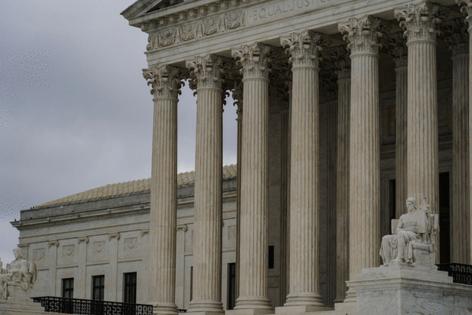Supreme Court to decide case on post-Election Day ballot counting
Published in News & Features
WASHINGTON — The Supreme Court announced Monday it will decide a case out of Illinois over the ability to challenge post-Election Day ballot counting, a high-profile cause for President Donald Trump and Republicans.
The appeal, brought by Rep. Mike Bost, R-Ill., and Illinois Republican presidential electors, seeks to revive their challenge to a state law that allows officials to count mail-in ballots that arrive after Election Day in federal elections.
The U.S. Court of Appeals for the 7th Circuit had tossed their case, ruling that Bost and the Republicans could not have the legal right to challenge the state law because they could not show they were harmed by it.
With the Supreme Court appeal, Bost and the other challengers seek to allow challenges to the Illinois law and other laws in states nationwide, which they argue have been improperly shut down by the courts.
In their petition, the Republicans told the Supreme Court this is a good chance to address post-Election Day ballot counting in normal litigation “outside of the high-stakes, emergency, post-election litigation where these issues commonly arise.”
Under the Illinois law, state officials count absentee or mail-in ballots that are postmarked before or on Election Day and arrive between Election Day and the end of the period to count provisional ballots, which the challengers identify as 14 days. Illinois is one of dozens of states with similar post-Election Day ballot counting.
The group argued that Congress has the power to set the federal Election Day under the Constitution, and it has done so through numerous laws.
“No otherwise valid state regulation can limit or abridge a valid exercise of this federal power,” the petition said.
The petition also cited Congress’ recent overhaul of the electoral count process after the 2020 election, which said Election Day can only be altered by states because of events that are “extraordinary and catastrophic.”
Illinois opposed the Bost appeal, arguing in a court filing that the challengers had not argued their interests were harmed by the law.
“They do not claim that Illinois’s ballot receipt deadline affected their likelihood of prevailing in any race in which they have ever competed or are likely to compete in the future,” the response said.
Both Trump and Republicans have railed against state laws that allow the counting of ballots that arrive after Election Day.
Overriding state laws that allow the counting of late-arriving ballots was one of the major provisions of the Republican voting overhaul bill that the House passed in April. The legislation has not yet advanced in the Republican-controlled Senate.
Trump also issued an executive order in April that sought to use the federal government to enforce his interpretation of Election Day, which included having the Justice Department “enforce” federal law against states that count ballots that arrive after Election Day or withhold funding against states that do so.
More than a dozen states have challenged the post-Election Day portion of the order and have sought to block it in a Massachusetts federal court.
Trump frequently complained about counting ballots that arrived after Election Day in the 2020 election, which frequently included more votes for his opponent, Joe Biden.
The case is Bost v. Illinois Board of Elections, and it is expected to be argued and decided in the Supreme Court’s next term, which starts in October.
Last year, the Supreme Court rejected an emergency application seeking to stop after-Election Day ballot counting in Pennsylvania that argued the state law violated the Constitution.
_____
©2025 CQ-Roll Call, Inc., All Rights Reserved. Visit cqrollcall.com. Distributed by Tribune Content Agency, LLC.







Comments